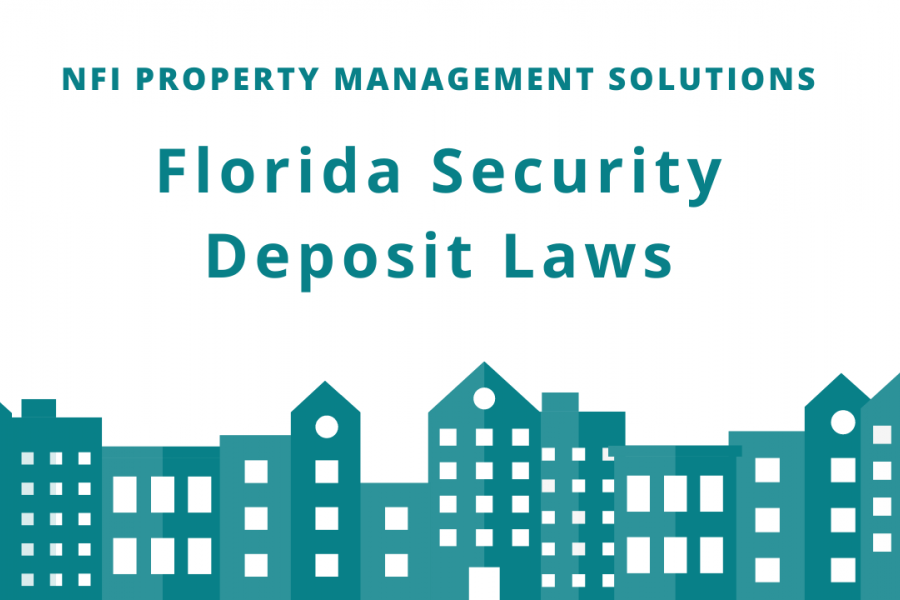
Are you an incoming landlord or a new owner of an investment property in Florida? It's important to understand that rental property ownership comes with numerous responsibilities, among them being the handling of the tenant's deposit.
Florida Landlord-Tenant Law protects the security deposit rights of both landlords and tenants. As a landlord, you must follow florida's security deposit law related to storing and returning your tenant's deposits and making deductions to security deposits.
The following information outlines the basics of Florida's security deposit law that a landlord must follow when making a lease agreement and handling a deposit in Florida.
Security Deposit Limits
Unlike other states, Florida doesn’t limit how much tenants have to pay rent for a security deposit under the security deposit laws. Essentially, a property owner can charge as much as they want for a security deposit payment. However, setting a deposit amount above the market average can discourage tenants who are willing to make rent payment from choosing your property, potentially harming your ROI as a landlord.
This is because many tenants do their due diligence before entering into a rental agreement and will not rent a property from a landlord with a higher-than-average security deposit, as it could indicate potential challenges during their or tenancy period.
Generally speaking, one-or-two months’ rent is a standard security deposit amount. This deposit amount should provide landlords with enough financial protection and funds for things like potential property damage beyond usual wear and tear or utility bills, as well as vacancy and eviction costs.
As a landlord, you need to also understand any limitations placed by security deposit laws on using security deposits as advance rent payment.
Storing Your Tenant’s Security Deposit
Per Florida Security Deposit Law, a Florida rental owner can choose to store a tenant's paid deposits in one of three ways.
The first way for landlords to store a tenant’s deposit is by placing it in an account at a Florida financial institution that doesn’t bear interest. This non interest bearing account must be located in Florida. Also, the money from the security deposits must not be commingled with other funds while it stays in your non interest bearing account.

Another way for Florida landlords to store security deposits is placing them in an separate interest bearing account.A landlord must pay the interest accrued in the interest-bearing bank account to their tenants annually and at the end of the lease term.
The interest can be paid during the lease period, with landlords having the option to either pay it directly to the tenants or credit it back to the renter as rent. It's important for landlords to comply with these lease obligations to ensure a smooth rental experience.
The other option landlords have is posting the deposit as a surety bond. The surety bond must be for the security deposits amount, or $50,000, whichever is less. The landlord must post the surety bond in the county where the landlord's property is situated. Also, if a landlord stores a security deposit using a surety company, they must give the tenants an annual interest rate of 5% on the bond.
Written Notice of Security Deposit Receipt
Florida landlords are required to provide their tenants with an initial written notice within 30 days of the tenants paying the security deposit. In the notice to your tenant, the writing must include certain crucial information about money including:
- The financial institutions where you're storing the tenant's deposit.
- The annual rate of interest that the money from tenant's deposit is being held at.
Florida security deposit laws require that every Florida landlord deliver this notice to the tenant either via mail or in person. If, for whatever reason, the landlord changes the manner of storage of the security deposit, the landlord has a responsibility to notify their tenant in writing within 30 days of making the change. If a landlord fails to notify the renter of this, they might face legal ramifications.
If you decide to add an early rental agreements termination fee that can be deducted from the security deposit, we reccomend sending a notice about this to your tenant or adding it directly to the lease agreement.
Legally Allowable Deductions
A landlord cannot make deductions to a tenant’s deposit payment for just any reason. A landlord's claim must have a legitimate cause at lease termination or else a legal dispute might follow.

In Florida, legitimate reasons for landlords to make deductions to a tenant’s security deposit include:
- To cover any unpaid rent owed to the landlord, such as a month's unpaid rent or any remaining balance of unpaid rent.
- To cover costs of property damage exceeding normal wear and tear found during a walk through inspection of the premises.
- Violations besides usual wear and tear that may cause the landlord financial liabilities if the tenant breaks the lease agreement. Normal wear and tear includes any damage to the property from regular use.
You can seek professional legal advice or consult a qualified attorney if needed.
Security Deposit Returns
When returning the tenant’s deposit in full, a landlord must do so within 15 days of terminating the lease agreement. If the landlord stored their deposit in an interest earning account, the landlord must also send the accrued interest alongside the deposit you’re returning.
However if you complete a walk through inspection and decide to return a partial deposit, based on legal justification such as property damage, you’ll have 30 days to notify your tenant that you wish to impose a claim after they move out.
In this initial written notice, the following should be stated:
- The landlord's intention to withhold a portion of the tenant’s security deposit including the reasons why they're making rent deductions.
- Notification that they have 15 days to contest the deductions after receiving your letter. It’s important to know that should the tenant contest the deductions, they must do so in writing.
According to Florida landlord tenant law, you need to send this tenant written notice to the tenant via certified mail to the tenant’s last known address. If you fail to take any of these steps, you may forfeit your right to make any deductions to the tenant’s deposit.

Please note that it’s the duty of the tenant to provide you with a forwarding address if the tenant moves. If your tenant doesn’t provide you their new address, you aren't required to serve them a written notice of the deposit via certified mail.
Upon receipt of the written notice, the renter may choose to either object or not object to the claim on the security deposit.
If they don’t object to the deducations you're making based on the walk through inspection, then you can make the appropriate deductions and return the remainder of the other funds to the tenant within 30 days of sending the initial notice. But if the renter objects do object, the matter could end up in a small claims court. The party that gets a favorable judgment will then be entitled to the court awarded sum, plus attorney fees and court costs from the losing party.
Security Deposit Transfers
Statute law regarding the security deposit in florida and rental property or rental unit ownership states that you must transfer a tenant’s security deposit plus any accrued interest to the new landlord upon change in property ownership. You also need to create a written receipt for the tenant indicating the amount that you have transferred from your banking institution upon any change in property ownership.
Once a landlord has completed these steps in the transfer, the landlord will be relieved of any responsibility regarding holding their tenant’s security deposit. However, if the landlord violated any terms prior to selling the property, they can still be held liable by their renter for those violations that occurred during the tenancy.
Bottom Line
Being aware of laws regarding the security deposit in florida. It is crucial to the success of every Florida landlord. However, keeping up to date on legal amendments to Florida Landlord Tenant Laws can be easier said than done for a landlord! If you're a landlord who wants to ensure the success of your investment property, consider reaching out to a leading property management company!
NFI Property Management Solutions has over 30 years of industry experience serving Florida landlords in the tri-county area. As a leading Florida property management company, our superior property management services have helped hundreds of real estate investors maximize their ROI!
Reach out to us today to learn more about our property management services!
Disclaimer: This blog isn’t a substitute for expert legal advice given by an attorney or otherwise. Also, laws change and this post might not be updated at the time of your reading. If you have any legal questions or concerns please reach out to a licensed attorney.